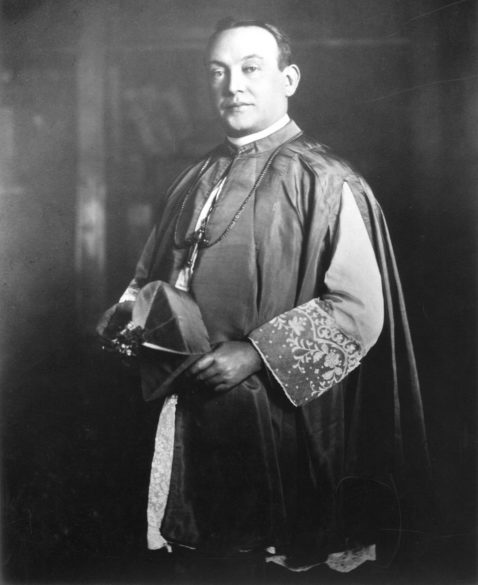From the Archives
By Mary Woodward
JACKSON – After last week’s article on the death of our bishops, I received a few inquiries about the arsenic poisoning of Bishop John Edward Gunn, which actually occurred in February 1916 in Chicago instead of 1915 Detroit as previously reported.
The event honored Archbishop George Mundelein who was recently appointed as Chicago’s top prelate. Most of Chicago’s “who’s who’s” were there. Bishop Gunn’s description of the event is so vivid that I will let his words paint the scene.
“On February 10th there was a meeting of the Catholic Church Extension Society followed by a dinner at the Archbishop’s house. Everybody was invited to wait over in Chicago for the big blow-out that was to take place on the night of February 10th when the city of Chicago was to banquet the new Archbishop. This banquet was engineered by Msgr. [Francis] Kelley of Catholic Extension.

“It took place in the banquet hall of the University Club and had among its guests forty Bishops, the head of the Army, the government officials, Governor of the State, Mayor of the City and everybody else worthwhile in Chicago.”
“It was at that banquet that the nearest approach to the wholesale poisoning of the hierarchy and the Chicago millionaires was attempted. After the oysters came the soup and while only a small cupful was served to each guest, before the last guest was served with soup, one hundred men were on the floor or were being carried out. There was a panic in the dining room and as no one knew its cause, everybody was frightened.”
“The University Club was turned into an emergency hospital and I was able to get to the elevator. I was brought down to one of the big reception rooms and gently deposited at full length on the floor. I was beside an Army Officer in full regimentals, a civic authority with a generous abundance of shirt waist, a Bishop from somewhere, and we were all in a very undignified scramble to reach the same spittoon.”
“The celebrated Doctor Murphy had charge of our room and while medical hygiene may be all right in the abstract there was very little time for the niceties or ethics of medicine on that occasion. A bell boy from the hotel went ‘round with a pitcher and a glass and insisted on giving everyone a dose of mustard and tepid water.”
“The man who did not take it was made to take it and the results were instantaneous, but the heavily cushioned upholstered University Club carried for a long time the marks of the banquet.”
“Of course, the thing broke up the banquet and about 100 hundred men just barely escaped death by poisoning. There were about 100 who did not take soup and they remained in the banquet hall to make and hear the speeches.”
“About one o’clock I managed to get to my hotel room more dead than alive and the feeling was the usual feeling after a bad attack of sea-sickness. I left as soon as possible for the Pass [Christian] but nothing could induce me to even look into the dining room on the way between Chicago and New Orleans.”
“The papers of the country and the detectives of every country got busy to find the poisoner. He was a socialist from Alsace-Lorraine, who was in charge of making the soup. It seems he studied poisoning as a sideline to Socialism and he knew with German accuracy the exact amount of soup to be served to each guest.”
“The soup was made a day or two in advance; the poison was added; and Jacques Crones took French leave. On the night of the banquet there were more guests than soup portions, with the result that the soup had to be watered and smaller portions served. It seems that this saved the entire banqueting party from having to attend their own funeral.”
“I was glad to get back to the Pass on Feb 12th where I stayed under a doctor’s orders close to a stomach pump until the end of the month.”
So that is the real story about the arsenic poisoning from the diary of Bishop Gunn. The diaries of bishops provide much history that never shows up in history books or news media. They are priceless treasures of diocesan life and the development of the church in our state, region and country.
We will share much more as time goes on from these unique perspectives of history from the very real men who held the office of bishop.
(Mary Woodward is Chancellor and Archivist for the Diocese of Jackson)
